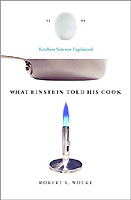 | |||||||||||||||||||
| |||||||||||||||||||
|
|
|
|
|
What Einstein Told His Cook: Kitchen Science Explained Robert L. Wolke Description From The Publisher: Einstein's cook was lucky. But you, too, can have a scientist in your kitchen: Robert L. Wolke. Does the alcohol really boil off when we cook with wine? Are smoked foods raw or cooked? Are green potatoes poisonous? With the reliability that only a scientist can provide, Robert L. Wolke provides plain-talk explanations of kitchen mysteries with a liberal seasoning of wit. A professor of chemistry and a lifelong gastronome, he has answered hundreds of questions about food and cooking in his syndicated Washington Post column, "Food 101." Organized into basic categories for easy reference, What Einstein Told His Cook contains more than 130 lucid explanations of kitchen phenomena involving starches and sugars, salts, fats, meats and fish, heat and cold, cooking equipment, and more. Along the way, Wolke debunks some widely held myths about foods and cooking. Whether kept in the kitchen or on the reference shelf, What Einstein Told His Cook will be a friendly scientist at your elbow. 20 illustrations. Reviews Wolke, longtime professor of chemistry and author of the Washington Post column Food 101, turns his hand to a Cecil Adams style compendium of questions and answers on food chemistry. Is there really a difference between supermarket and sea salt? How is sugar made? Should cooks avoid aluminum pans? Interspersed throughout Wolke's accessible and humorous answers to these and other mysteries are recipes demonstrating scientific principles. There is gravy that avoids lumps and grease; Portuguese Poached Meringue that demonstrates cream of tartar at work; and juicy Salt-Seared Burgers. Wolke is good at demystifying advertisers' half-truths, showing, for example, that sea salt is not necessarily better than regular salt for those watching sodium intake. While the book isn't encyclopedic, Wolke's topics run the gamut: one chapter tackles Those Mysterious Microwaves; elsewhere readers learn about the burning of alcohol and are privy to a rant on the U.S. measuring system. Sometimes the tone is hokey (The green color [in potatoes] is Mother Nature's Mr. Yuk sticker, warning us of poison) and parenthetical Techspeak explanations may seem condescending to those who remember high school science. However, Wolke tells it like it is. What does clarifying butter do, chemically? Answer: gets rid of everything but that delicious, artery-clogging, highly saturated butterfat. With its zest for the truth, this book will help cooks learn how to make more intelligent choices. —Publishers Weekly, Copyright 2002 Cahners Business Information, Inc.
About the Author Robert L. Wolke is professor emeritus of chemistry at the University of Pittsburgh and winner of the James Beard Foundation and Bert Greene awards for food journalism. | ||
All materials contained in http://www.WineCountryTravel.com are protected by copyright and trademark laws and may not be used for any purpose whatsoever other than private, non-commercial viewing purposes. Derivative works and other unauthorized copying or use of stills, video footage, text or graphics is expressly prohibited. |
